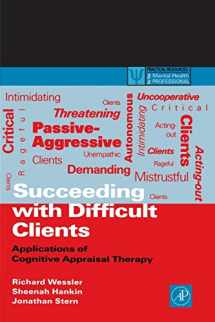
Succeeding with Difficult Clients: Applications of Cognitive Appraisal Therapy (Practical Resources for the Mental Health Professional)
Book details
Summary
Description
"I know that I am doing therapy correctly and well, so why aren't some of my clients changing?" "Why do I feel anxious when I think about my next session with that difficult client?" When psychotherapy stalls, it's time to try new ideas. The authors' experience with difficult clients -- uncooperative, hostile, uncommitted to change -- gave them a new perspective on working with therapeutic impasses. Papers describing Cognitive Appraisal Therapy have appeared in many books and journals, and now for the first time these ideas are compiled into a single volume. Heavily influenced by the psychotherapy integration movement and in a radical departure from conventional cognitive-behavior therapy, they see motivation in terms of affect and attachment rather than cognitive schemas, and resistance and setbacks as the result of emotional setpoints. Practitioners from all corners of the psychotherapy landscape will be able to integrate Cognitive Appraisal Therapy into their therapeutic approaches to help them work successfully and confidently with difficult clients as individuals, as couples and in groups.


We would LOVE it if you could help us and other readers by reviewing the book
Book review



